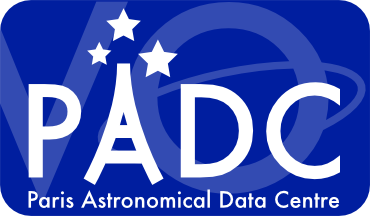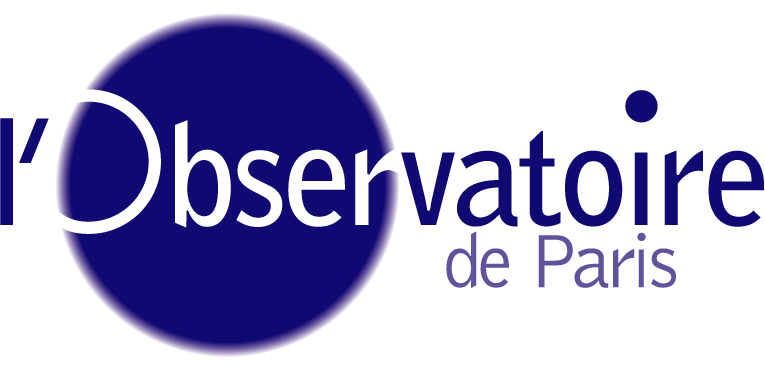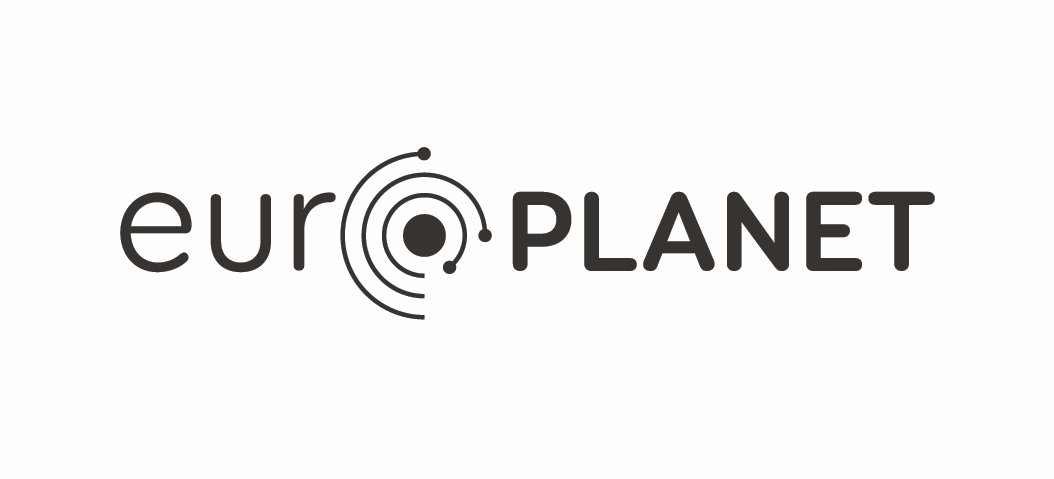VESPA / Call for data services 2021
Scope of the call
The aim of the VESPA activity in the Europlanet2024-RI programme is to make Planetary Science and Solar System data accessible and searchable through an interoperable system following the principles of Open Science. More than 50 databases were published in the frame of the Europlanet-2020 programme, and as many should be made available on-line during the 4-year Europlanet2024-RI programme. The system relies on standards from the Astronomical Virtual Observatory, adapted to Solar System studies - to get a better idea, just take a look at the VESPA data query service.
One way to promote new databases is through an annual call to the science community. In the combined 2020-21 VESPA open call, up to 10 projects will be selected to enlarge the data content accessible via the VESPA interface. An on-line workshop will be organized with the selected participants to help them design and set up their project, and to open it to the user community. This workshop will be held on-line, from Nov 29 to Dec 1, with a follow-up period (December 1-9), and organized by IRAP/CNRS Toulouse and Jacobs University, Bremen. We hope to be able to restore the usual face-to-face format in 2022.
Examples:
- - Typical case: You have generated a dataset for a publication, you want to share it using an advanced query system fulfilling the requirements of the Open Science Policy
- - Secondary case: You're working with a lot of data subsets from one or several archives, and you want to enhance the access with advanced query capabilities, and possibly make them ready for Machine Learning techniques (e.g., ground based telescopic support for Rosetta; several disconnected spectral databases of minerals, etc)
- - Any other situation is acceptable (e.g., historical datasets, teaching and training tools…), as long as the interest to the Europlanet community is demonstrated.
Time line
- Call opens: 10 August 2021
- Call closes: 7 October 2021
- Selection of teams by Oct 20th, 2021
- Telecons with selected teams from Nov 22, 2021
- Workshop:
- We schedule a first period of common activities (Nov 29-Dec 1) with support from the organizing personel, followed by a finalization period when specific issues will be handled asynchronously (spaning Dec 1-9).
- Post-workshop telecon, Nov 2021
- Finalization review performed with the proposers, Dec 2021
- Service delivery date: the aim is to have the new services published by January 2022
FAQ
- Who is eligible?
- Any research team in Planetary Science or neighbouring fields. Primarily support will be given to EU teams but collaboration with teams external to the EU will be considered by the VESPA management team. Europlanet and VESPA beneficiaries are welcome to this on-line format.
- What do I gain?
- Visibility for your published work/observations.
- Compliance with FAIR Data guidelines for Data Availability Statement from peer-reviewed journals.
- Fulfilment of Open Science policy requirements with internal forces only (data are made available from your institute).
- A prompt answer to daily mails asking for your data!
- If you already have a database, adopting to the VESPA framework will provide high level
search functions on its contents, on-line visu / analysis capacities,
and cross-correlation with other datasets in neighbouring fields, with
minimum efforts. Your data will be searchable from the
VESPA interface and other community tools.
- What is the outcome?
- At the end of the process, you will have a TAP server installed
in your institute, one data service connected to the Planetary
Science Virtual Observatory, and the know-how to implement additional
services and to share more data. A single server can accommodate many
services in Planetary Science, Heliophysics, and Astronomy. Knowledge
of the EPN-TAP metadata system may also help handle datasets not openly
distributed, e. g., related to an experimental archive, or during data analysis phase.
This may be a first step towards migrating your data on the cloud and preparing them for mass processing (Machine Learning techniques, etc) - Which data?
- Derived / highly processed data are preferred,
because their content can be of interest to other communities.
Observational, simulated, or experimental data are eligible.
- What type of data access / data status?
- Data will be publicly open/accessible - you are responsible for checking the
legal status of the data you wish to provide, and must accept to share them publicly.
- Which support?
- VESPA provides support to design and install a data service
through preliminary telecon, workshop, post-workshop helpdesk. A
finalization review will be performed with the proposers.
- What do VESPA pay for?
- In more peaceful times, we used to invite attendees to wonderful locations
(Toulouse, Graz, Prague, Rome) - don't regret it, they had no time to visit!
- What skills does this require?
- You need a science expert of the field and a software engineer - at least someone not reluctant to editing
code templates and installing software. The installation process has been optimized to remain as light as possible.
- Where will the data be located?
- Data services are installed in the proposing institutes, which
have to set up and maintain a server and a database. Service definition
files will be backed up on VESPA gitlab, but you are responsible for data storage -
we can help identify external solutions, such as EU-founded data repositories available
for this purpose (e. g., Zenodo, B2share).
- How many proposals are selected?
- The baseline is to select 4 to 5 proposals per call (summing up to 10 in this combined workshop)
- Who is evaluating?
- Europlanet-2024 VESPA VA-task3 members (IRAP/Toulouse, Jacobs Univ/Bremen, CBK-PAN/Warsaw, IWF/Graz, Observatoire de Paris)
- Are non-European teams also eligible?
- Absolutely.
- When will the next call take place?
- This is an annual call, the next one is planned for spring 2022.
- What does VESPA mean by the way?
- VESPA stands for Virtual European Solar and Planetary Access.
Evaluation criteria
- Scientific merit:
- Existing publications
- Data quality (used for publication? + data quality assessment plan)
- Size of the community
- Added value of proposed database/service, compared to existing databases/archives
- Status of the data is of course a major issue (reserved services sharing proprietary data are currently studied only internally to VESPA)
- Science domain balance in VESPA. Pre-selection may occur if the subject matter is not mature enough in VESPA - in which case VESPA will be happy to study the problem together with the proposing team.
- Readiness level of data products and database:
- Data readily available at the time of proposal/workshop
- Finalized, directly usable data products are preferred (expect difficulties with bunches of irregular Xcel files…)
- Standard format and available metadata (or plan to derive them from the data products/documentation)
- Team capabilities:
- Scientific assessment of data quality, possible update of dataset, recalibration, extension...
- personnel available for setting up a service (2-3 telecons + workshop): at least 1 scientist + 1 engineer (FTE involved depend on a lot of factors)
- Sustainability (at least for 5 years), and estimated ability to maintain the service (e.g.: is there any data distribution system already installed?)
- Additional databases that could be implemented in the future by the team
- Consensus/agreement in the proposing institute is important, in particular to ensure that local technical support will be available to maintain the service
Example proposal
Proposals must address the following (in addition to the above criteria) - don't make it formal, but please provide reasonable details to allow the VESPA team to assess the level of maturity. These are mandatory fields in the submission form:
- Team info:
- Name / Address / Lab / Country
- Science Contact / technical contact
- Service info:
- Title of database
- Description of database: science theme / purpose, context, potential audience, related publications. Origin/status of data.
- One or several use cases to explain a typical use for research and/or education
- Service details:
- Processing level? (raw/calibrated, derived/processed)
- Readiness level of dataset / descriptions
- Format of products
- Number of products, size of database
- Scope of database: living/increasing, completed, limited in time coverage?
- Do you own data rights (if not, what is their status)? Do you (plan to) host the data?
- Data collection status: bunch of files + doc vs existing database (and what type: SQL, XML...)
- Description of local technical maintenance / sustainability plan
Propose your project!
Please propose your project via the Submission Form. In addition to the mandatory fields of the form, a short PDF document describing the project in more detail can be helpful (1 to 4 pages):
*** VESPA AO Submission Form, 2021 ***
Further information
| VESPA standards | Standards used in VESPA |
Credits
If your research benefits from the use of VESPA, we would appreciate if you could include the following acknowledgement and reference in your publication:
"This research has made use of the VESPA portal and services (https://vespa.obspm.fr) funded by European Union's under grant agreement No 871149"
VESPA: A community-driven Virtual Observatory in Planetary Science. Erard S et al., 2018. doi: 10.1016/j.pss.2017.05.013
Please also acknowledge the original data providers.
Except where explicitly mentioned, data are distributed under Etalab Open License 2.0 (compliant with CC-BY 2.0 license).
The Europlanet 2024 Research Infrastructure project has received funding from the European Union's Horizon 2020 research and innovation programme under grant agreement No 871149.
The Europlanet 2020 Research Infrastructure project has received funding from the European Union's Horizon 2020 research and innovation programme under grant agreement No 654208.
This work used the EGI Infrastructure with the dedicated support of IN2P3-IRES and CESNET-MCC.
VESPA has first been designed in the frame of Europlanet-RI JRA4 work package (IDIS activity).
Additional funding was provided in France by the Action Spécifique Observatoire Virtuel and Programme National de Planétologie / INSU.
 |

|  |
 |

